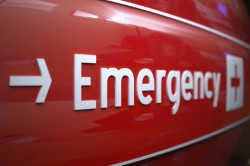call 800-291-1732 (Who Answers?) for a free referral.

Codeine overdose can lead to a trip to the emergency room for treatment.
Codeine, a prescription medication, is most often prescribed to treat conditions involving mild to moderate pain symptoms. As an analgesic, codeine falls within the narcotics or opioid class of drugs. When taken as prescribed codeine overdose is unlikely. In cases where a person abuses the drug or takes unusually large amounts, the potential for codeine overdose increases substantially. Treating codeine overdose involves a series of procedures that typically take place in an emergency room setting. Certain counteractive medications can also be used to alleviate distress during a codeine overdose.
Codeine Overdose
Data collected by the Centers for Disease Control & Prevention (CDC) show narcotics overdoses have become the leading cause of car accident fatalities. The CDC estimates the quantities of analgesic-related medications distrusted by pharmacies amounts to 700 milligram of morphine per person for three weeks.
Codeine is well known for its ability to slow nerve impulses and overall bodily functions in general. This drug specifically targets the body’s central nervous system. When taken in excess, users can experience seizures and/or fall into a comatose state. As codeine alters nerve impulse transmission in the brain, this increases the likelihood of experiencing recurrent seizures throughout a person’s lifetime.
Codeine can also depress a person’s respiratory functions to the point where he or she stops breathing. Its effects on the body’s respiratory functions pose the greatest threat to codeine overdose.
Emergency Room Procedures
As large amounts of codeine can affect any one of the body’s major systems, treatment for codeine overdose requires emergency room staff to monitor a person’s vital signs (pulse, breathing rate, temperature and blood pressure) and treat symptoms accordingly. For all cases, the first step entails detoxification to prevent any further effects of the drug on the body.
Detoxification procedures entail administering a gastic lavage with activated charcoal. A gastic lavage uses a tube inserted through the nasal passage. A saline solution flows through the tube into a person’s upper gastrointestinal tract to flush out any remaining codeine materials. The solution is then suctioned up out of the gastrointestinal tract and back through the nose. Activated charcoal is used to help absorb any remaining codeine from stomach. This procedure helps prevent the intestines from absorbing any more of the drug.
Emergency room procedure will also include running an IV fluid drip in order to support the body’s overall vascular tone and blood pressure levels. In cases where respiratory functions have been affected, oxygen therapy or mechanical ventilation is used to help support a person’s respiratory functions.
Naloxone Treatment
Respiratory failure accounts for the majority of fatalities caused by codeine overdose. When a person is in respiratory distress, emergency room staff typically administer an inverse agonist agent known as naloxone. As an agonist agent, naloxone blocks any ongoing effects from codeine in a person’s system. As respiratory distress can quickly turn into respiratory failure, blocking any further effects from codeine becomes a primary concern.
Naloxone may be given in an IV or as a nasal spray. Hospital staff will also administer oxygen or use mechanical respirators to ensure a person’s breathing rates return to normal.
Resources:
Centers for Disease Control & Prevention
http://www.cdc.gov/mmwr/preview/mmwrhtml/mm6101a3.htm

 Opiate Addiction Treatment May Prevent Overdose -
The appropriate treatment can help prevent an opiate overdose and lead you down the path to recovery.
Opiate Addiction Treatment May Prevent Overdose -
The appropriate treatment can help prevent an opiate overdose and lead you down the path to recovery.  Methadone Treatment in Codeine Rehab -
Codeine, a potent opioid drug, can become addictive when abused over a long period of time. For any type of opioid drug addiction, methadone treatment is a viable option. Depending on the severity of your codeine addiction, you may want to choose methadone as a part of your overall codeine rehab treatment program. Methadone as ...
Methadone Treatment in Codeine Rehab -
Codeine, a potent opioid drug, can become addictive when abused over a long period of time. For any type of opioid drug addiction, methadone treatment is a viable option. Depending on the severity of your codeine addiction, you may want to choose methadone as a part of your overall codeine rehab treatment program. Methadone as ...  How to Choose a Codeine Addiction Treatment -
Codeine, commonly used to treat mild to moderate pain symptoms, belongs to the same class of drugs as morphine, heroin and opium. Highly addictive and habit-forming, the long-term use of codeine places users at considerable risk of addiction. As a pain management treatment, codeine works well at keeping pain symptoms in check, though its effects ...
How to Choose a Codeine Addiction Treatment -
Codeine, commonly used to treat mild to moderate pain symptoms, belongs to the same class of drugs as morphine, heroin and opium. Highly addictive and habit-forming, the long-term use of codeine places users at considerable risk of addiction. As a pain management treatment, codeine works well at keeping pain symptoms in check, though its effects ...